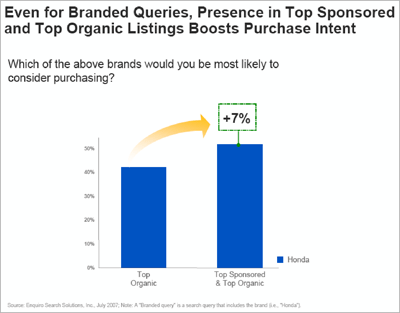The recent ICANN (Internet Corporation for Assigned Names and Numbers) ruling, which approved the registering of any domain suffix for websites, could prove to be disastrous for the paid search advertising industry and will no doubt impact natural search in the medium to long term.
ICANN regulates the way web addresses are assigned to ensure that computers can communicate with each other. In the UK most web addresses have the suffix .uk, while the most popular domain name suffix in the world is of course .com. Now, the possibilities are endless and the new names could range from place names to products.
How does this affect Paid Search
The primary concerns for search engine advertisers is that with an endless number of domain suffixes available, companies with larger paid search budges could effectively monopolise paid listings by exploiting a loophole in Google's 'one ad per company' policy as explained below.
Currently to have more than one ad from the same company showing on Google's paid listings requires the use of multiple domains. Previously companies would use .com together with co.uk, .org and so on, in order to get around Google's restrictions. Prior to the ICAAN ruling there were around 20 other possibilities such as .biz, .tv or .net.
The new ruling means that a potentially infinite number of domain suffixes can be applied by any one company to capture and direct web traffic, which for a sophisticated paid search campaign strategy, throws up numerous issues.
Aggressive advertisers can create multiple domain suffix's and target these to appear in paid listings for any given keyword. This coupled with affiliate campaigns would mean that limiting competition for prominent visibility on paid listings becomes a monumental task. With effectively more domains jostling for the same number of ad spaces, bid costs could rise exponentially.
Dominating listings
The 'multiple domains' approach is by no means anything new to paid search. At present many companies use this as a tactic to effectively own the first page of search results for specific keywords in their campaign. This approach is common to both paid and natural search strategies.
Example:
If you type 'Sky' into Google, you will be presented with at least six different paid search all ads owned by Sky, as illustrated in the screenshot below. Notice how each ad displays a different domain name.

To achieve this result it's likely that Sky is allowing its affiliates to use these domains. As you can see, any competitor wanting to get a look in would need to pay a premium to fight for a position. If all six Sky affiliates then decided to bid against Sky's competitors for all of their main keywords and not just one, you can very quickly see how the space might become very expensive, very quickly. Sky's competitors wouldn't just be fighting Sky's current six domains, but every other company using the same strategy and any other domain suffix that Sky chooses to incorporate into it's campaigns.
Trademark bidding comes into play
The ruling by Google on May 5th to allow bidding on trademarked terms will also have a bearing on the ICANN ruling. Where previously it may have seemed fruitless to advertise many domains under your own brand search campaign, companies may now need to use the Sky tactic as a way to push out the competition and reclaim ownership of their brands.
This may in fact be the solution to Google's change in trademark bidding policy which has outraged the community. By owning multiple domains, a brand now has the ability to take the power back. This could also alter the reliance on affiliate relationships, which may deteriorate as a result of a brand owning more than one domain and effectively becoming their own super-affiliate.
Owning your brand space has become a central theme in developing a search strategy.
A recent study conducted by Google and Enquiro (Brand Lift of Search, April 2008) concluded that having both the brand in the top organic and sponsored positions boosted brand recall by 13%+.
Furthermore, there was also an uplift of 7% on purchase intent when consumers saw both a paid and organic listing. (See diagram below).

Therefore owning this space is imperative whether advertisers take the Sky approach and control the brand space entirely or they work with their affiliates and partners to dominate the space. Either way the ICANN ruling does pose a serious threat for paid search advertising and advertisers should act now to prevent the potential onslaught of competitive activity.
What does this mean for natural search?
Search engine algorithms function largely independently of the domain extension, and the introduction of new top level domains (tld) shouldn't make any difference. Some tests in the past have suggested a possible bias towards certain tld's, but these have been inconclusive. It's worth bearing in mind that search engines could impose an algorithmic dampening of a domain extension, but this seems unlikely - pages should continue to be judged according to the same factors of relevancy and credibility that they currently are, regardless.
However, there are also wider concerns than just search and search engine trust - users have also grown used to today's suite of familiar domain extensions, and any radical departure from these for any serious business is likely to be greeted with some uncertainty - if users can actually remember your new domain name in the first place.
For these reasons it's difficult to see the importance of the traditional domain extensions fading any time soon. Having said that, it doesn't hurt to play safe. If an industry specific domain extension of your brand becomes available it's almost certainly worth acquiring, even if it's only used in the short term to redirect to a main website.


